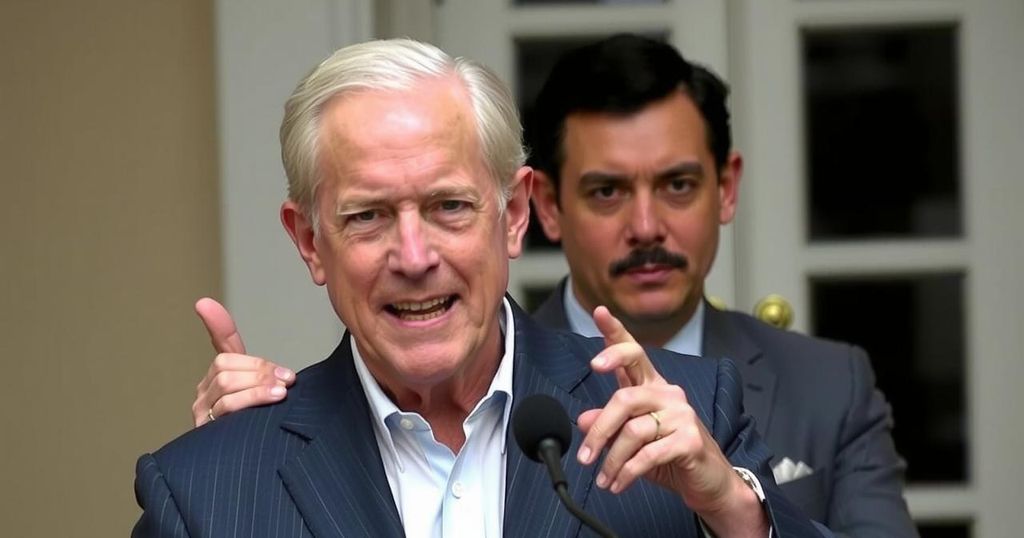President Biden will meet with Venezuelan opposition leader Edmundo González, recognized as the “president-elect” following disputed elections in July where he claims victory over Nicolás Maduro. As protests continue demanding election transparency, González has initiated a tour to gain international support against Maduro’s regime, which has faced scrutiny and sanctions from the U.S. government. The meeting signifies potential reinforcement of democratic efforts in Venezuela.
President Joe Biden is slated to hold a meeting with Edmundo González, a prominent leader of the Venezuelan opposition, at the White House on Monday, as per a senior official. This meeting is significant as the Biden administration has recognized González as Venezuela’s “president-elect” following the controversial elections held in July. González has asserted he won decisively against incumbent President Nicolás Maduro, a claim backed by opposition data but robustly denied by Maduro’s administration. Consequently, Maduro has declared himself victorious while withholding official election results, which has drawn widespread international condemnation.
Amid the election dispute, Venezuela is experiencing significant protests, with demonstrators demanding the release of election results from individual polling stations to expose alleged electoral fraud by Maduro’s regime. In a bid to strengthen international backing for his cause, González, who serves as a retired diplomat for the main opposition coalition, has embarked on a tour across the Americas. He began his journey over the weekend with stops in Argentina and Uruguay and has called on Venezuelan expatriates in Washington to protest outside the Organization of American States to amplify calls for democratic reforms.
Meanwhile, Maduro has taken steps to solidify his power, having been invited to take the oath for a third term this upcoming Friday by Venezuela’s National Assembly, despite ongoing disputes over the election. The lack of transparency in the vote counting process has fueled controversy, as González’s team reported that their data from over 80 percent of the voting machines indicated he received double the votes compared to Maduro.
In connection with the ongoing political crisis, the Biden administration recently imposed sanctions on 21 officials aligned with Maduro, accusing them of involvement in the repression faced by citizens following the election. These sanctions, announced by the Department of the Treasury in November, join a list of other punitive measures aimed at isolating Maduro’s inner circle, though critics question their overall effectiveness given that many regime figures continue to maintain substantial control in Venezuela’s governance.
Biden’s upcoming meeting with González is anticipated to be a crucial opportunity for bolstering González’s international profile and increasing pressure on the Maduro regime, although the specific agenda of the discussion remains unspecified. This meeting encapsulates U.S. interests in supporting democratic governance in Venezuela amid a significant political crisis.
The political landscape in Venezuela has been increasingly tumultuous, primarily due to the disputed elections held in July, which have led to significant political unrest and protests. Edmundo González, representing the opposition coalition, asserts a victory against President Nicolás Maduro, whose administration has declared him the winner while failing to provide comprehensive election results. The Biden administration’s recognition of González as president-elect illustrates a shift in U.S. policy aimed at supporting Venezuela’s democratic opposition, emphasizing the importance of transparent electoral processes in the region. The tensions surrounding the elections have triggered international backlash and ongoing calls for reform, complicating relations between Venezuela and the global community.
In conclusion, the scheduled meeting between President Biden and Venezuelan opposition leader Edmundo González is a pivotal moment in the context of Venezuela’s electoral crisis. The recognition of González as president-elect by the Biden administration underscores U.S. support for democracy in Venezuela, particularly in light of the allegations of electoral fraud and Maduro’s repressive policies. As Venezuela navigates through widespread protests and international scrutiny, this engagement may serve to amplify the opposition’s calls for reform and transparency in governance.
Original Source: www.newsweek.com






